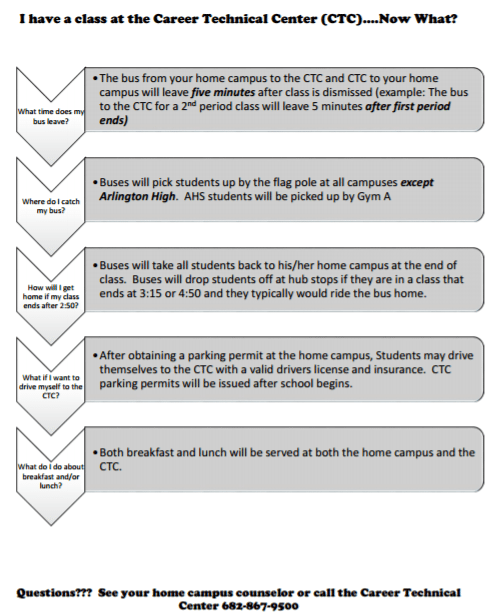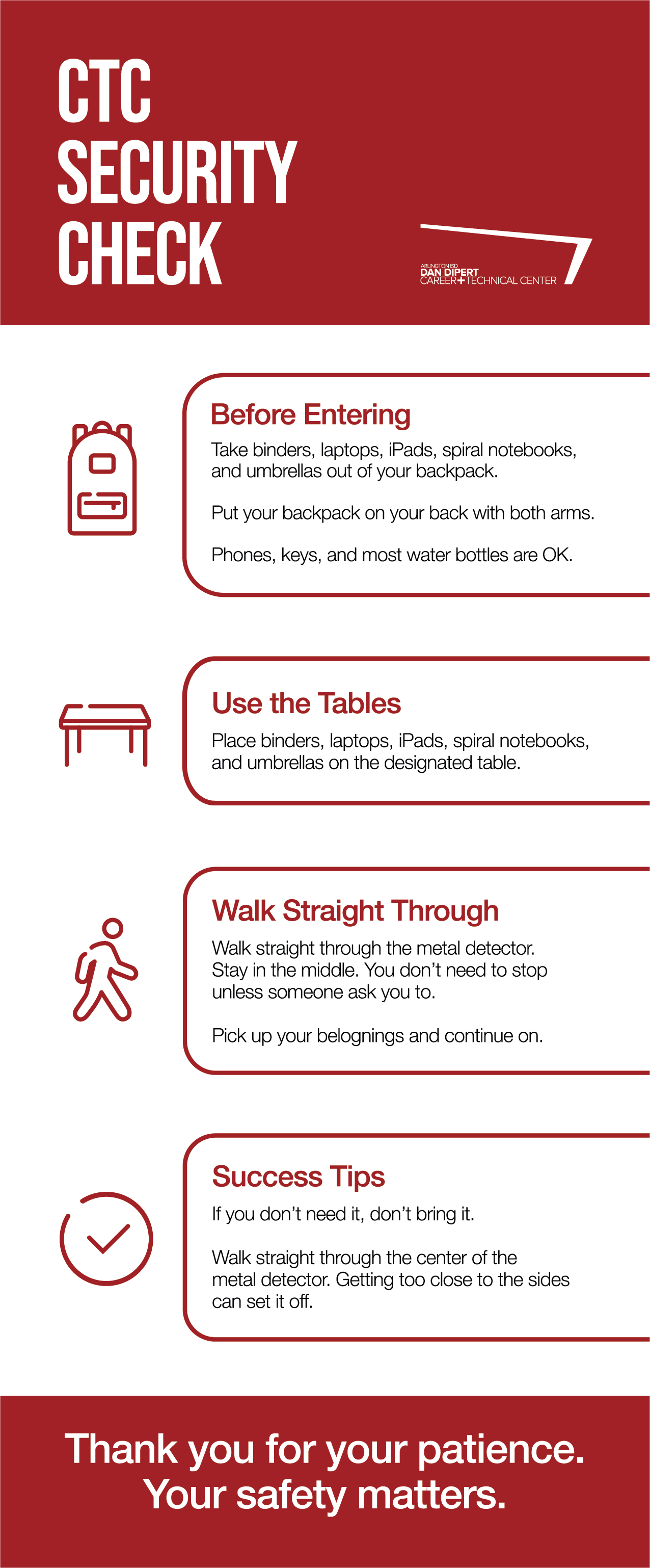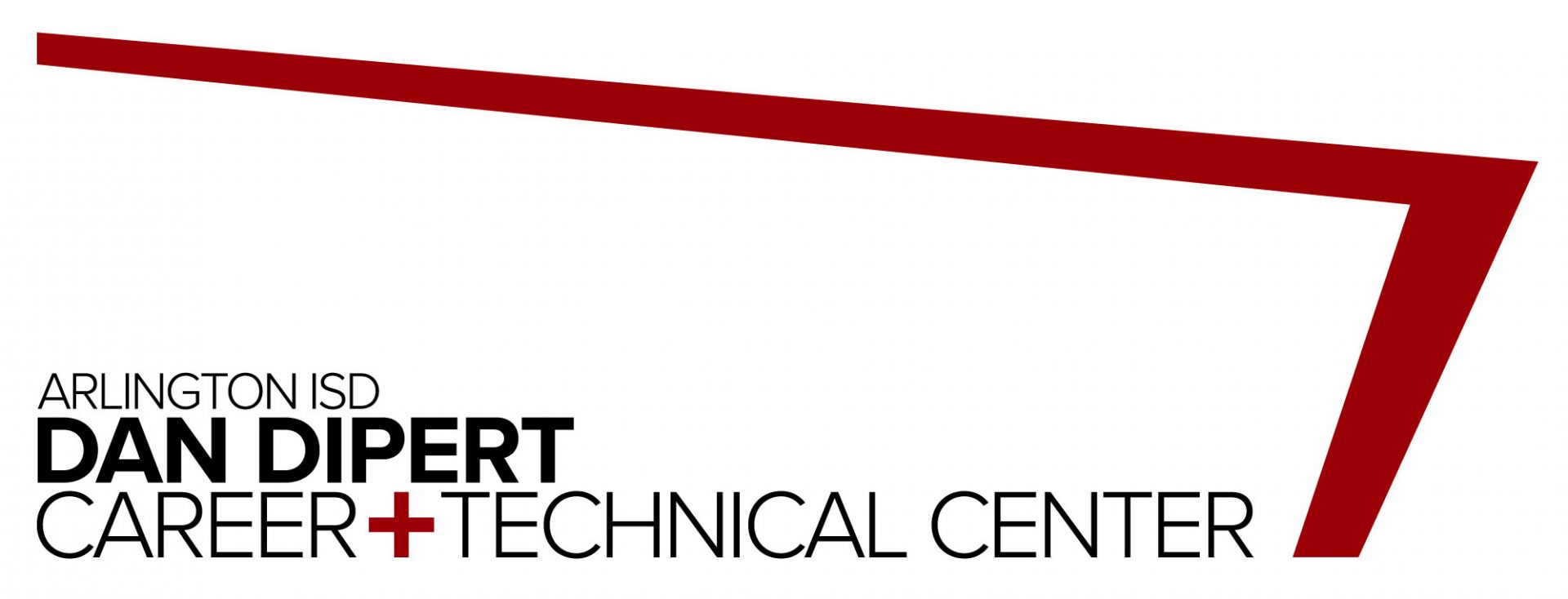Breadcrumb Navigation
Student Behavior
As part of the Texas Education Code (Sec. 37.0012), all schools in Texas shall designate a Campus Behavior Coordinator whose primary responsibility is to maintain student discipline for the campus and be a contact for parents or guardians concerning individual student disciplinary actions by the school. The person designated may be the principal of the campus or any other campus administrator selected by the principal.
Your Campus Behavior Coordinators
| Loading... |
Dress Code
Expectations for Student Behavior
The AISD Dan Dipert Career and Technical Center (CTC) & the Agricultural Science Center (ASC) are campuses with a business/college culture. We have very high expectations for our students. As a CTC/ASC student, you will be treated with the utmost respect and considered to be a mature young adult with specific goals for learning. Our courses enable students to gain experience and knowledge to go to college or trade schools as well as earn industry certifications and/or licensure by the state of Texas. This can help put them a step ahead of other students in obtaining higher paying positions after high school, either as a part-time student attending college/trade school or as a full-time employee in a business/industry right out of high school.
Because we consider our students to be mature and goal focused, there are privileges that are granted at the CTC and the ASC that you will not see at your home campus. These privileges include:
- No Bells at the CTC or ASC
- Furniture in common areas to study or network with other students
- Opportunities to participate in student organization competitions with the chance to attend area, state, and national competitions
- Job acquisition skills such as resume writing and interview preparation and participation
- Access to a professional clothing closet to utilize during interviews
Certainly with privileges come responsibilities. To stay in alignment with the CTC/ASC business/college culture, there are high expectations for student behavior at both campuses. We have visitors in our buildings daily, including the superintendent and central administrators, administrators from other campuses, top officials from our city, community members and visitors from school districts from around the metroplex and state. Therefore, we expect every student to help us greet visitors and make them feel welcome. We expect every student to be an ambassador for the CTC/ASC. There are non-negotiable expectations for behavior of our students. The expectations for every CTC/ASC student are as follows:
- A CTC/ASC identification badge is required to be worn and visible while on either campus every day.
- Students are expected to follow the Student Code of Conduct dress code and if appropriate, the professional or industry standard dress associated with their particular career path or interest.
- Students are expected to be in class on time and engaged in learning each and every day.
- Furniture for students is located in the Bistro and other common areas throughout the campus. Students need to treat furniture with respect (no lounging as if at home taking a nap). Students need to leave furniture in designated areas. There will be no moving of furniture to different areas in the building.
- Students are expected to dispose of trash in campus trash receptacles and pick up after themselves both inside and outside the campus.
- If you choose to listen to your music or use an electronic device in the Bistro or other common areas, you must use head phones or earbuds. Your music or electronic device does not need to be heard by anyone but you.
- You are in a college/business environment while at the CTC/ASC. Understand that classes or other business is going on all around you. Please be respectful and keep your voices down. If you are taking a call, be respectful and observant and move to an area where you will not disturb others.
- It is a privilege to drive to the CTC/ASC, not a right. Students who choose to drive are required to register their cars and pick up a parking permit from the CTC/ASC. There will be no charge for the CTC/ASC parking permit since the student will purchase a permit from their home campus. You must have both permits on your car to park at the CTC/ASC. The CTC/ASC permit may be revoked if safety requirements are not followed.
- Students who drive are required to adhere to posted speed limit signs (10 mph limit in parking lot).
- All students who drive are required to park in the North lot only.
- It is expected that each student, faculty and staff member will treat each other with respect.
First Week Questions

Security Procedures

Student Cell Phone Policy
Cell Phones/Technology
The Dan Dipert Career + Technical Center & the Agricultural Science Center wants to establish a Business/College Culture. With that being said, there will be opportunities for students to use their technology freely in all common areas, collaboration areas, bistro and hallways. Students must wear earbuds/headphones while using their technology. If students take personal calls while in common areas, collaboration areas, the bistro and hallways, they will be expected to use an appropriate voice level so that their conversation does not disturb others around them.
Teachers will be expected to develop and enforce a cell phone/technology usage expectation in their classroom. The teacher needs to make sure that the expectations are clearly outlined and that all students are aware of what is and is not appropriate use of cell phones/technology in their classroom.
The CTC & ASC will have a different cell phone policy from the other traditional high schools. In trying to prepare our students to be business and/or college ready, we WILL NOT take up cell phones, turn them into the office and charge the $15.00 fine. However, we will address the failure of students to meet our expectations in proper usage of cell phones/technology in the following way:
- The first time a student does not meet your expectations for appropriate cell phone/technology usage in your classroom, you will take their phone for the remainder of the class period and then return it to the student at the end of class. The teacher is expected to document this action and discuss/review the expectations for that class with the student.
- The second time a student does not meet your expectations for appropriate cell phone/technology usage in your classroom, you will take their phone up for the remainder of the class period and then return it to the student at the end of class. The teacher is expected to document this action and contact the students parent. The teacher will also contact the CTC assistant principal of the second violation. The assistant principal will meet with the student and discuss the issue of not meeting expectations.
- The third time a student does not meet your expectations for appropriate cell phone/technology usage in your classroom, you will take their phone up for the remainder of the class period and then return it to the student at the end of class. The classroom teacher will write a discipline referral in teams for Non-Compliance detailing the 3rd time the student has violated the classroom cell phone/technology expectations. The CTC and home campus assistant principals will assign appropriate Group 1 Corrective actions. The assistant principals will contact the parents.
- The fourth time a student does not meet your expectations for appropriate cell phone/technology usage in your classroom, you will take their phone up for the remainder of the class period and then return it to the student at the end of class. The classroom teacher will write a discipline referral in teams for Non-Compliance detailing the 4th time the student has violated the classroom cell phone/technology expectations. The CTC and home campus assistant principal will assign appropriate Group 2 Corrective actions. The assistant principals will contact the parents.
- If this behavior continues and the previous efforts have shown no change in the students’ behavior, the teacher will continue to write referrals for the student in TEAMS for every cell phone/technology violation that occurs. The CTC and home campus assistant principal will discuss the appropriate corrective actions to assign ranging from losing the privilege of using cell phones/technology at the CTC, continued assignments in ISS/Choices, to any other corrective action deemed appropriate by campus administration and approved by the Office of Student Behavioral Support Systems.
If at any time during this process a student refuses to comply with an adult’s directive to do something with their cell phone/technology, the CTC assistant principal needs to be contacted immediately and the student sent directly to the office. The directives from adults include, but are not limited to asking students to put their device away in class, hand it over to the teacher/adult in the classroom, using their earbuds/head phones in common areas and hallways, and using appropriate voice level during conversations. Once a student refuses the directive of an adult concerning cell phone/technology usage, it is no longer a cell phone/technology issue. It has become a non-compliance issue and a referral needs to be written immediately.
Tardy Policy
 Tardy Policy
Tardy Policy
1st Tardy – Pass to class and conference with teacher
2nd Tardy – Pass to class and conference with teacher
3rd Tardy – Pass to class, conference with administration
4th Tardy – Pass to class
- Meeting with administration
- Discuss issues for tardiness
- Develop Plan of Correction to address tardy issue
- Verbal communication with parent/guardian
- Warning letter sent to student and parent/guardian.
5th Tardy – Pass to class
- Meeting with administration
- Review plan – make changes if necessary
- Verbal communication with parent/guardian
6th Tardy – Pass to class
- Meeting with administration
- Writing assignment issued to student (Time management techniques, Possible consequences for tardiness at work/college, etc..)
- Written notification to parent
7th Tardy – Pass to class
- Meeting with administration
- Writing assignment issued to student (Personal reflections and changes to actions to improve attendance).
- Warning letter issued to student & parent (each additional tardy will be referral to home campus)
8th and all additional Tardies – Pass to class
- Referral to home campus – Consequences issued by home campus (Detention, ISS, etc..)


 Tardy Policy
Tardy Policy